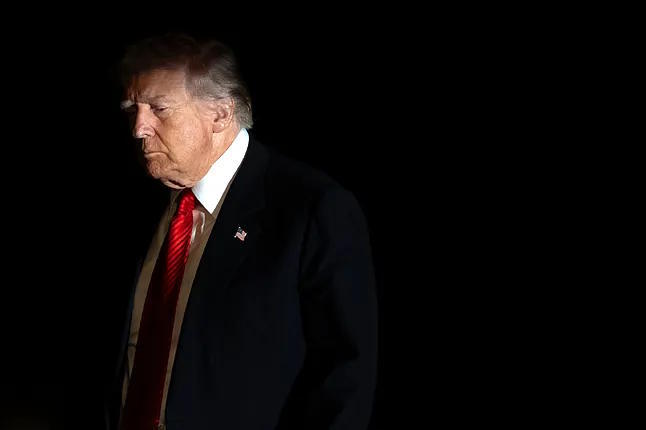The President of the United States is increasing pressure on Caracas. After mobilizing ships, destroyers, the world's largest aircraft carrier, and even a nuclear submarine, Donald Trump spoke about Venezuela again on Sunday in an interview with CBS's 60 Minutes program. When asked if "Nicolás Maduro's days were numbered," he clearly responded that yes, it's a matter of time, and he doesn't have much time left. "Yes, I would say so. I think so," he warned.
Trump is outspoken, unable to keep quiet, with an opinion on everything, and he loves to repeat his favorite ideas. However, after the largest naval deployment in the region in decades and sinking more than a dozen boats, killing over 60 people he considers "narco-terrorists," he has repeatedly avoided giving details of his plans, leading everyone in Washington to believe that promised attacks on Venezuelan mainland are imminent unless Maduro resigns or is removed by civilians or the military to avoid a clash. "We have very secret plans... but what kind of question is that? How am I going to tell you? We'll see what happens," he coincided from Air Force One on his return trip to Washington at night.
In 60 Minutes, he reflected with a little more time. "I doubt it. I don't believe it," he said about the possibility of going to war with Venezuela. "But they have treated us very badly, not only with drugs; they have brought hundreds of thousands of people to our country that we didn't want, people from prisons... they emptied their prisons into our country. Also, if you notice, they emptied their mental institutions and asylums in the United States of America because Joe Biden was the worst president in our country's history," he added.
Last Friday, two major American media outlets reported that the military had already identified targets, ports, or military airports that according to their intelligence, or at least according to the White House, are used for drug trafficking, following orders from President Maduro, whom the US accuses of being none other than the leader of the "Cartel of the Suns." Trump then said that it was not true that he had given the green light for an attack or was considering it. And Secretary of State Marco Rubio went even further, telling the Miami Herald that their information was spoiled goods that someone, the administration sources cited in their article, had planted. But no one takes it very seriously.
Much assertiveness, apparent calm (unlike the situation in Nigeria, where he does not rule out sending troops), as the pieces are increasingly being put in place. Exactly like before the summer with Iran. After repeatedly denying the possibility of an attack, when rumors started to spread due to the deployment of B2 bombers to areas increasingly close to the region from the east of the planet, Trump attacked. He claimed he would take several weeks to think about it, but when he uttered those words, the order for the planes to strike the Iranian nuclear facilities had already been given.
This Sunday on television, Trump was not very explicit, but at no point did he rule out or settle the matter. On the contrary. "I'm not going to tell you that. I mean... I'm not saying it's true or false, but... you know, no...," he responded initially to the question about possible attacks on military bases or installations on land, beyond boats supposedly in international waters. "I wouldn't lean towards saying we're going to do it, but... because I don't talk to journalists about whether I'm going to attack or not. I'm not going to... you're an excellent journalist, very talented, but I'm not going to tell you what I'm going to do with Venezuela, if I'm going to do it or not," he added immediately.
The exchange continued for a few more minutes. The host, trying not to let go, wanted to know why he was sending the aircraft carrier Gerald Ford to the region if not to attack. Trump, in a failed attempt to dodge, said something very vague, "because it has to be somewhere. It's very big," but upon insistence, he returned to the threats to Caracas. "Well, we're not going to allow countries from... Venezuela, in particular, has been bad. They have gangs... Tren de Aragua, have you heard of it?" he repeated trying to change the subject.
The bulk of the president's speech is well known. He blamed Joe Biden, insulting him repeatedly. He reiterated that Venezuela has "emptied its prisons and mental institutions in the US" and elaborated on details of murders and hands cut off by the "Tren de Aragua," "the most criminal and vile gang that exists." But nothing more substantial about a possible attack or if it's just brutal pressure for the regime to betray and hand over Maduro.
